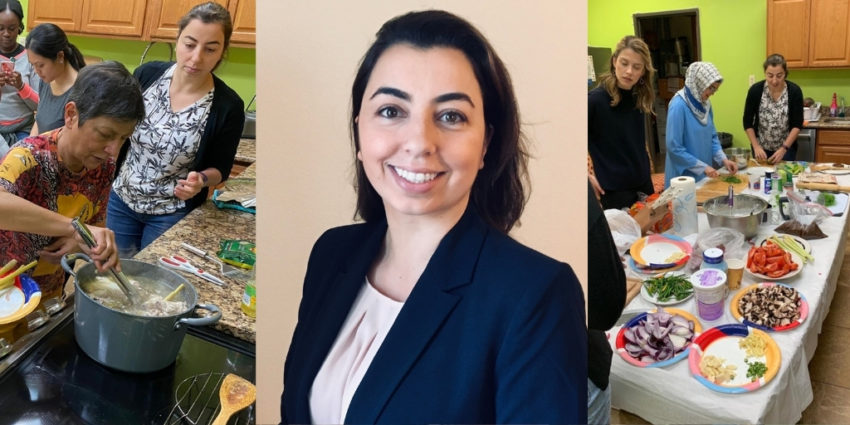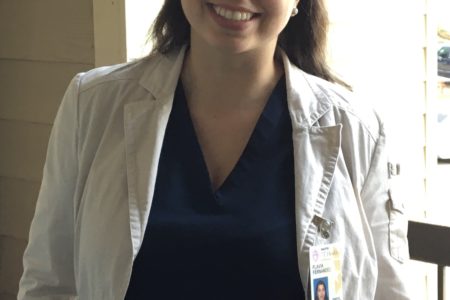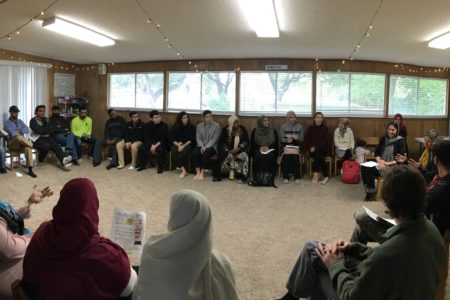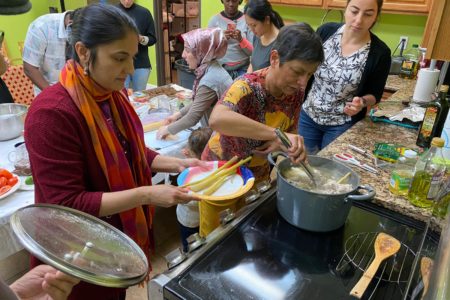
Share On Social!
From a young age, Flávia Fernandes wanted to practice medicine.
Thanks to years of resiliency and dedication, she is now working toward a medical degree as a medical humanities student at UT San Antonio.
But she’s already working hard to improve the health of her community.
Fernandes, who is originally from Brazil, is part of the El Bari UT Health Healthy Choices Team — a group of San Antonio doctors, students, and community members who are creating and sharing healthy recipes online along with health education resources.
For Fernandes, this is a life-long goal realized.
“The work I’m doing now is better than what I dreamed for,” she said. “I wanted to learn about the ways doctors engage with the community and promote positive changes in people’s lives. It’s been so nice learning and getting to help.”
From Journalism in Brazil to Medical School in Texas
A Brazilian native, Fernandes has been working her way to a career in healthcare for a long time.
When she was a teenager, her grandfather suffered a stroke that left him bedridden in the hospital. During his treatment, Fernandes wanted to step up and help, especially when it came to managing his treatment once he left the hospital.
The spark for her medical passion, as well as her talent for it, became clear amid this hardship. Among a number of her grandfather’s caretakers, she often spoke up and asked the necessary questions to ensure recovery.
Still, more hardship was to come. Due to personal, family circumstances, Fernandes was unable to initially pursue an education in medicine. So, she pivoted to pursuing another career aimed at serving the public — reporting the news.
After working as a journalist in Brazil, Fernandes made her way to the US, settling in San Antonio.
It was after this massive life change that led her to make a career change, too.
“The call to help others is what originally led me to journalism because information and knowledge are really powerful in helping change people’s lives,” Fernandes said. “Journalism was a great field to work in, but as I got older, I wanted to make my original dream come true — and that’s what I did.
“When I moved to Texas, I felt like I had to pursue my dream in medicine.”
Fernandes applied and was accepted at UTSA’s bachelor of arts degree in medical humanities with pre-medicine/pre-medical studies. It was here that all her hard work finally felt worth it.
“When you think about changing careers, you have a naive point of view. When you start to work, even a little bit, and you feel happy about what you are doing — I think that’s the answer you’re looking for. When you see yourself [achieve your goals],” she said.
Through her involvement with UTSA’s Latin Medicine Student Association, Fernandes was able to connect with Dr.Dr. Fozia Ali, a physician from UT Health San Antonio and a member of the El Bari UT Health Healthy Choices Team.
When Fernandes learned of their work, she didn’t hesitate to volunteer with the group.
Advocating for “Culinary Well-Being”
The El Bari UT Health Healthy Choices Team’s goal is to provide their network─members of the San Antonio community─with healthy and simple-to-make recipes — all for free.
They offer roughly 30 different food recipes that have been reviewed by a select team of dietary medical specialists at UT Health San Antonio to ensure that they are nutritional. Recipes fall into categories of heart healthy, diabetic friendly, as well as protein and fiber rich.
Examples include:
- Baba Ghanoush (Roasted Egg Plant Dip)
- Strawberry Banana Peanut Butter Smoothie
- Mujaddara
- Coriander Fritters (Kothimbir Wadi)
- Avocado Muffins

This project has found much success among their community participants, according to Fernandes. This includes having a lot of participation from their community members in San Antonio. In fact, they garnered enough support to create a virtual community cookbook, all of the recipes listed were submitted by community members, according to Elizabeth Stewart, one of the student leaders of the project and a medical student UTHSA.
“The reason I fell in love with the program is because of the level of community support and engagement,” she said. “It’s what makes this project so special. In 2018, we held sessions where we [and our community members] all cooked together at Alibaba Grocery Store and then took a tour of the facility led by a nutritionist with University Health System. Our leadership team is growing, [as a result].”
Using community ambassadors, the El Bari UT Health Healthy Choices Team, gains information from the grassroots level. These ambassadors assess needs in the community and advocate engagement, according to Dr. Ali.
Fernandes says that is, in-part, thanks to the way their project operates — creating an atmosphere of collaboration.
“What I love most about the Health Choices team its lead by physicians, medical students, but also the community has the opportunity to bring back their feedback and tell how to better change their eating habits or incorporate physical activities,” Fernandes said. “There is a wide range of initiatives that we do.”
The group also hosts a number of resources, like leading sessions in which the group’s physicians inform their network of various aspects of healthy eating.
They also provide informational articles that can educate anyone on a variety of food-centric intelligence, including topics such as:
- Superfoods
- Healthy Substitutes for Recipes
- Anti-Inflammatory Diets
- Organic vs. Conventional Foods
- Mindful Eating: Promoting Mental Well-Being
Most importantly, though, is fostering a collabortive, community-oriented project, according to Ali.
“When you’re a family physician, I think your job is not complete until you work in your community — you need to know your community,” she said. “This [project] was a way for me to connect with the community. Engage with them. Find the ways we connect with them.”
You Can Get Involved to Improve Health in Your Community, Too!
To get involved with the work of Fernandes, Ali, and the El Bari UT Health Healthy Choices Team, San Antonio, visit their website or email the team.
But you can still make a difference for your community anywhere in the U.S.
Anyone can help leaders push for systemic change by getting involved in neighborhood associations and local committees, boards, and commissions. These groups rely on your input to shape plans and policies that impact health and food access and nutrition in your area.
Find out how to get involved.
“City boards and commissions are … how our community navigates the daily and weekly decisions that make El Paso run smoothly and to become the kind of community we all want,” according to the City of El Paso. 
You can share important health information with local decision-makers.
Just download a Salud America! Health Equity Report Card! The report card will show you how you will see how your county is doing on a variety of health-related conditions compared to the rest of your state and nation. Themes include healthy food access, housing, transportation, poverty, healthcare, and more.
Email your Health Equity Report Card to community leaders, share it on social media, and use it to make the case to address healthy food access where help is needed most!
“Community involvement is the heart of the Health Choices Team,” Fernandes said. “The leadership group knows the theory behind it and has an idea about topics to be covered in the sessions to promote healthy living. However, only when the participants engage in the discussion and share how they implemented the changes in their daily lives do we get to see the positive impact. It has a sort of ripple effect.”
Explore More:
Healthy FoodBy The Numbers
1
Supermarket
for every Latino neighborhood, compared to 3 for every non-Latino neighborhood
This success story was produced by Salud America! with support from the Robert Wood Johnson Foundation.
The stories are intended for educational and informative purposes. References to specific policymakers, individuals, schools, policies, or companies have been included solely to advance these purposes and do not constitute an endorsement, sponsorship, or recommendation. Stories are based on and told by real community members and are the opinions and views of the individuals whose stories are told. Organization and activities described were not supported by Salud America! or the Robert Wood Johnson Foundation and do not necessarily represent the views of Salud America! or the Robert Wood Johnson Foundation.



